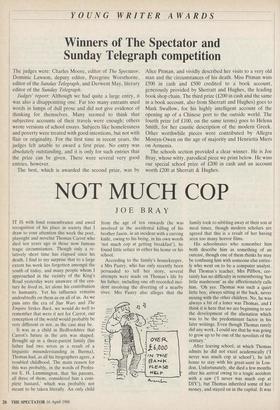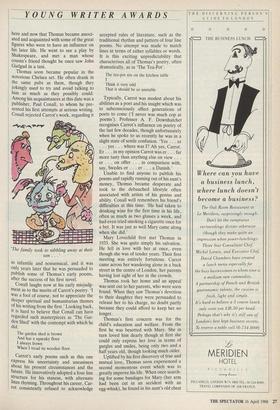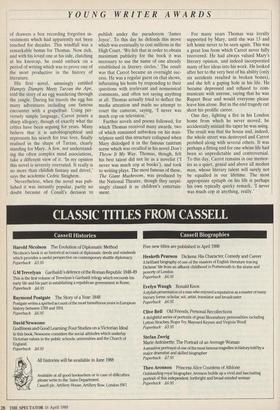NOT MUCH COP
JOE BRAY
IT IS with fond remembrance and awed recognition of his place in society that I draw to your attention this week the poet, playright and novelist Thomas Carrot who died ten years ago in those now famous tragic circumstances. Though only a re- latively short time has elapsed since his death, I find to my surprise that to a large extent his work lies forgotten amongst the youth of today, and many people whom I approached in the vicinity of the King's Road yesterday were unaware of the cen- tury he lived in, let alone his contribution to humanity. Yet his influence remains undoubtedly on them as on all of us. As we pass into the era of Star Wars and The Empire Strikes Back, we would do well to remember that were it not for Carrot, our conception of the world would probably be very different or not, as the case may be.
It was as a child in Bedfordshire that Carrot's future in the arts was shaped. Brought up in a three-parent family (his father had two wives as a result of a linguistic misunderstanding in Burma), Thomas had, as all his biographers agree, a troubled childhood. The main reason for this was probably, in the words of Profes- sor E. H. Lemmington, that 'his parents, all three of them, considered him a com- plete bastard,' which was probably not meant to be taken literally. An only child from the age of ten onwards (he was involved in the accidental killing of his brother Jason, in an incident with a carving knife, owing to his being, in his own words `not much cop at getting breakfast'), he found little solace in either his home or his school.
According to the family's housekeeper, a Mrs Pastry, who has only recently been persuaded to tell her story, several attempts were made on Thomas's life by his father, including one oft-recorded inci- dent involving the diverting of a nearby river. Mrs Pastry also alleges that the
family took to nibbling away at their son at meal times, though modern scholars are agreed that this is a result of her having seen too Many horror films.
His schoolmates who remember him both describe him as something of an outcast, though one of them thinks he may be confusing him with someone else entire- ly who went on to be a computer analyst. But Thomas's teacher, Mrs Pillbox, cer- tainly has no difficulty in remembering 'her little mushroom' as she affectionately calls him. 'Oh yes. Thomas was such a quiet little boy, always sitting at the back, never mixing with the other children. No, he was always a bit of a loner was Thoinas, and I think it is here that we are beginning to see the development of the alienation which was to be the predominant factor in his later writings. Even though Thomas rarely did any work, I could see that he was going to grow up to be one of the novelists of the century.'
After leaving school, at which Thomas admits he did not excel academically (I never was much cop at school'), he left home to stay with his great-aunt in Lon- don. Unfortunately, she died a few months after his arrival owing to a tragic accident with a saw CI never was much cop at DIY'), but Thomas inherited some of her money, and stayed on in the capital. It was
YOUNG WRITER AWARDS
here and now that Thomas became associ- ated and acquainted with some of the great figures who were to have an influence on his later life. He went to see a play by Shakespeare, and met a man whose cousin's friend thought he once saw John Gielgud in a taxi.
Thomas soon became popular in the notorious Chelsea set. He often drank in the same pubs as them, though they Jokingly used to try and avoid talking to him as much as they possibly could. Among his acquaintances at this date was a publisher, Paul Conall, to whom he pre- sented his first attempts at serious writing. Conall rejected Carrot's work, regarding it `The family took to nibbling away at their son . .
as infantile and nonsensical, and it was only years later that he was persuaded to publish some of Thomas's early poems, after the success of his first novel.
Conall laughs now at his early misjudg- ment as to the merits of Carrot's poetry. 'I was a fool of course, not to appreciate the deeper spiritual and humanitarian themes of his writing from the first.' Looking back, it is hard to believe that Conall can have regarded such masterpieces as 'The Gar- den Shed' with the contempt with which he
did.
The garden shed is brown And has a squeaky floor I always frown When I tread its wooden floor.
Carrot's early poems such as this one express his uncertainty and uneasiness about his present circumstances and the future. He innovatively adopted a four line structure for his stanzas, with alternate lines rhyming. Throughout his career, Car- rot consistently refused to acknowledge accepted rules of literature, such as the traditional rhythm and pattern of four line poems. No attempt was made to match lines in terms of either syllables or words. It is this exciting unpredictability that characterises all of Thomas's poetry, often dramatically, as in 'The Tea-Pot'.
The tea-pot sits on the kitchen table Think it very odd That it should be so unstable
Typically, Carrot was modest about his abilities as a poet and his insight which was to subconsciously affect generations of poets to come CI never was much cop at poems'). Professor A. F. Downhatchet recognises Carrot's influence on poetry of the last few decades, though unfortunately when he spoke to us recently he was in a slight state of senile confusion. 'Yes . . . er . . . yes . . . where was I? Ah yes, Carrot. Er . . in my opinion Carrot was er . . . far more tasty than anything else on view . . er . . . on offer . . . in comparison with, say, Swedes or . . . er . . . a Danish.'
Unable to find anyone to publish his poems and rapidly running out of his aunt's money, Thomas became desperate and took to the debauched lifestyle often associated with artists of his genius and ability. Conall well remembers his friend's difficulties at this time. 'He had taken to drinking wine for the first time in his life, often as much as two glasses a week, and had even tried smoking a cigarette once for a bet. It was just as well Mary came along when she did.'
Mary Lovechild first met Thomas in 1933. She was quite simply his salvation. He fell in love with her at once, even though she was of tender years. Their first meeting was entirely fortuitous. Carrot came across her wandering alone in a back street in the centre of London, her parents having lost sight of her in the crowds.
Thomas took her home and an appeal was sent out to her parents, who were soon found. When they saw Thomas's devotion to their daughter they were persuaded to release her to his charge, no doubt partly because they could afford to keep her no longer.
Thomas's first concern was for the child's education and welfare. From the first he was besotted with Mary. She in turn loved him dearly though at first she could only express her love in terms of gurgles and smiles, being only two and a half years old, though looking much older. Uplifted by his first discovery of true and mutual love, Thomas soon experienced a second momentous event which was to greatly improve his life. When once search- ing for some bandages for Mary (her arm had been cut in an accident with an egg-whisk), he found in his aunt's old chest
YOUNG WRITER AWARDS
of drawers a box recording forgotten in- vestments which had apparently not been touched for decades. This windfall was a remarkable bonus for Thomas. Now rich, and with his loved one at his side, clutching at his kneecap, he could embark on a period of writing which was to prove one of the most productive in the history of literature.
His first novel, amusingly entitled Humpty Dumpty Meets Tarzan the Ape, told the story of an egg wandering through the jungle. During his travels the egg has many adventures including one famous encounter with a grapefruit. Using per- versely simple language, Carrot points a sharp allegory, though of exactly what the critics have been arguing for years. Many believe that it is autobiographical and represents his search for true love, finally realised in the shape of Tarzan, clearly standing for Mary. A few, not understand- ing the often complex mind associations, take a different view of it. 'In my opinion this novel is severely overrated. It really is no more than childish fantasy and drivel,' says the academic Cedric Sleighem.
Nevertheless, when the novel was pub- lished it was instantly popular, partly no doubt because of Conall's decision to
publish under the pseudonym 'James Joyce'. To this day he defends this move which was eventually to cost millions in the High Court. 'We felt that in order to obtain maximum publicity for the book it was necessary to use the name of one already established in literary circles.' The result was that Carrot became an overnight suc- cess. He was a regular guest on chat shows, infuriating his hosts by responding to their questions with irrelevant and nonsensical comments, and often not saying anything at all. Thomas actually tried to deflect the media attention and made no attempt to court the cameras, saying, 'I never was much cop on television.'
Further novels and poems followed, for which Thomas received many awards, two of which remained unbroken on his man- telpiece until this structure collapsed when Mary dislodged it in the famous tantrum scene which was recalled in his novel Don't Throw It My Way. Thomas, though, felt his best talent did not lie as a novelist (`I never was much cop at books'), and took to writing plays. The most famous of these, The Giant Mushroom, was produced by the National Theatre, though they surpri- singly classed it as children's entertain- ment. For many years Thomas was loyally supported by Mary, until she was 13 and left home never to be seen again. This was a great loss from which Carrot never fully recovered. He had always valued Mary's literary opinion, and indeed incorporated many of her ideas into his work. He looked after her to the very best of his ability (only six accidents resulted in broken bones), and she left a gaping hole in his life. He became depressed and refused to com- municate with anyone, saying that he was Rupert Bear and would everyone please leave him alone. But in the end tragedy cut short his prolific career.
One day, lighting a fire in his London home from which he never moved, he accidentally mislaid the taper he was using. The result was that the house and, indeed, the whole street was destroyed and Carrot perished along with several others. It was perhaps a fitting end for one whose life had been so unpredictable and controversial. To this day, Carrot remains in our memor- ies as a quiet, genial and above all modest man, whose literary talent will surely not be equalled in our lifetime. The most appropriate epitaph on his life is perhaps his own typically quirky remark, 'I never was much cop at anything, really.'
































































 Previous page
Previous page